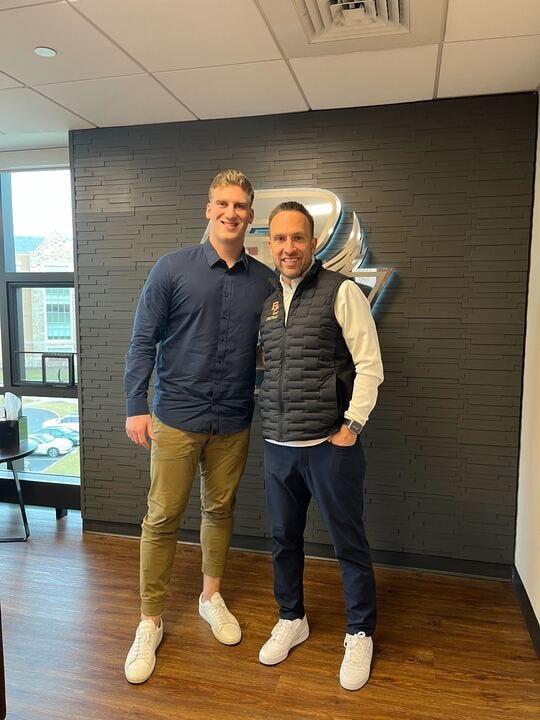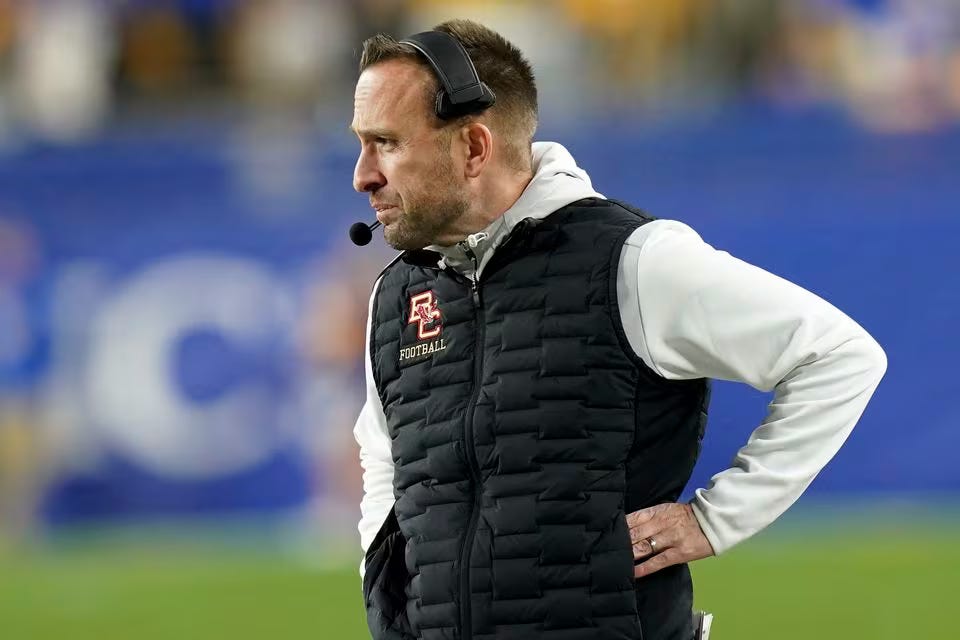🏈 🔵 Why Jeff Hafley Left CFB For The NFL
Jeff Hafley took a new job recently as the new DC for the Green Bay Packers. A few days before he left Boston College, I sat down with him for an hour-long interview. Here's what happened.
Welcome to Blue Chip Journal by Adam Breneman — a 2x per-week newsletter with analysis, hot takes, and news on all things college football, NIL, and recruiting. Subscribe now and join nearly 13,000 other sports fans, and share this newsletter with all the college football fans you know!
Blue Chip Journal is a reader-supported publication. To receive new posts and support my work, consider becoming a free or paid subscriber.
Why Jeff Hafley Left CFB For The NFL
Hey friends,
Nearly two weeks ago, I sat down with former Boston College head coach Jeff Hafley at his office in Chestnut Hill, Massachusetts.
Since Hafley took over for the Golden Eagles in 2020, the program’s culture and trajectory have completely shifted for the better.
This past season, Hafley secured the school its first winning season since 2018, marked by wins over Virginia, and Syracuse, and a bowl victory over No. 24 SMU. Additionally, Hafley’s undermanned roster took a top-five Florida State bunch to the wire, falling 31-29 at home.
While Boston College’s trajectory seemed to be trending in the right direction, a shocking turn of events rocked the program just hours after our interview.
Hafley decided to leave Boston College as its head coach to become the defensive coordinator of the Green Bay Packers under Matt LaFleur.
Typically, coaches don’t leave head coaching jobs for coordinator roles — at the college or NFL level. But with the politics of college football in complete disarray, Hafley decided to up and leave his post for a pure-play coaching role without the daily optics of the college game.
During our conversation, Hafley discussed his displeasure with college football’s rules and regulations at length.
Let’s take a look at how Hafley suggested he would improve the college game, and what likely drove him away from Boston College in favor of the NFL.
This newsletter is presented by... PrizePicks
PrizePicks is the easiest way to play daily fantasy. Getting started is very simple — register for an account, make a deposit, and pick more or less on 2-6 player stats to win payouts of up to 25x!
Aside from offering an initial deposit match of up to $100, fans can now use my promo code AdamB for an even BIGGER discount upon downloading the app. Click on the link below to get started today!
The Playing Field Must Be Leveled
When NIL legislation was first adopted at the NCAA level, the organization’s governing body intended it to help players earn money off individual advertising deals and marketing campaigns.
Since June 30, 2021, the interim name, image, and likeness policy has hardly represented its original business-like model.
Instead, pay-to-play collectives have hindered college football’s recruiting process. Additionally, with the transfer portal, players are entering the database to seek out non-guaranteed “offers” from rival schools to help maximize their full financial potential.
Without ground rules in place, like a salary cap or an anti-tampering framework, Hafley believes college football is further away from a clear-cut solution than ever before.
“I don’t know what the solution is,” Hafley told me regarding NIL discrepancies and the transfer portal’s untimely window. “I just don’t see it going away. I mean, you could talk about solutions right now at conferences. Everything seems to need a solution right now. We just need more rules, right?”
In a recent interview with On3, Hafley discussed how college football’s original intent, built on players receiving life-altering degrees from prestigious universities, has completely flipped upside down.
Now, with just months until graduation, players are leaving their current schools just to chase short-term dollar signs instead of potentially securing favorable job opportunities outside of football.
“There are kids that are leaving good academic schools with a semester or two semesters left, where they’re going to get a life-changing degree, and instead, they’re getting convinced to transfer,” Hafley said in January. “It’s way bigger than making a few bucks right now. I get it, that’s easier said than done… But, we have to look at the degree aspect of this thing, too.”
At schools like Boston College, NIL budgets are far inferior to in-conference giants such as Clemson, Florida State, and Miami. For the Golden Eagles to win at the highest level, Hafley thinks college football needs a salary cap to promote parity.
Whether or not Boston College would pull in enough cash to hit the cap’s limit remains to be seen, but financial imbalance seems to be a significant reason why Hafley packed his bags for the NFL ranks last week.
“I’m all for it,” Hafley told me about NIL. “I’m all for players getting paid — I think it’s great. That with the portal together is a complete disaster, which I think everybody has said. There just needs to be rules. I mean, look at the NFL. You have a salary cap, you can use x amount of money, and there’s some parity there.”
Fully Adopt the NFL Rulebook
Aside from issues with college football’s optics from a recruiting and player retention standpoint, Hafley told me he thinks there needs to be changes to further reflect the NFL’s on-field product.
This year, college football adopted a four-quarter running clock system, where the game clock no longer stops to move the chains following each first down.
As a result, offensive coordinators lost up to 14% of total plays from 2022 into 2023. To keep production heightened, Hafley thinks the sport should adopt the NFL’s 18-foot wide hash marks.
“We’ve kind of went to the clock [changes],” Hafley told me. “It’s running, but I’d add in the two-minute warning, just like the NFL. Situational football is huge, so I think playing the game this way makes you think a little bit more. But, why not make the field dimensions the same?”
By widening the has marks, coaches across the country argue that the passing game would open up more, while also allowing defenses to better conceal coverages. In October, Ohio State head coach Ryan Day said, “Those [current] hashes were built for football a long time ago.”
Additionally, Hafley believes college football should allow quarterbacks to have audio and microphone access in their helmets — just like the NFL does.
In light of Michigan’s sign-stealing probe that put the sport’s integrity into question, headsets in quarterbacks’ helmets would revolutionize how college football offenses operate.
It would not just enhance play-calling efficiency, but it would create a more dynamic product and style of play — without worrying about opposing defenses catching onto signaling trends.
“I’d probably go more to the NFL hashes and more to the NFL rules,” Hafley said. “I’d put the quarterback mic in his helmet, [which would] help us not steal signals, and again, if you’re going to signal, then during the game steal signals. I get it, no problem. Hide your signals better.”
Tampering Will Continue To Hurt Mid-Major Programs
At Boston College, it’s difficult to land high-profile recruits over the likes of opposing regional giants.
With Penn State, Syracuse, Pitt, Ohio State, and Michigan all vying for the same prospects, program prestige alone hinders the Golden Eagles’ ability to pick up prized prospects.
But, with financial incentives now on the line, it’s nearly impossible for Boston College to keep its roster intact from year to year — no matter how sound its culture is internally.
“Players are getting paid a lot of money,” Hafley told me. “Tampering is going on, and then there’s those that are following whatever rules that are there to the best that they can. But, everything is happening, and I don’t think the intent is [what it originally was.]”
Despite finishing with a promising 7-6 record, including a Fenway Bowl victory over No. 24 SMU, the Golden Eagles currently have 12 outgoing transfers in the portal.
The mass exodus is largely a reflection of game-changers seeking pay increases through collectives at larger schools. Without a cap in place, Hafley doesn’t see a way to fix the problem in the short term, which likely played a role in his decision to leave the program he helped build.
“That league was built [in a way] that if you’re the last place team, you get the first-round pick,” Hafley said. “They want it to be a competitive league, and everything is built in the NFL to be a competitive league… It is built to kind of keep it balanced, right? We’re going down a road where there’s going to be more imbalance than ever, and that’s the problem.”
With the Green Bay Packers, Hafley will simply be able to coach football like he has for the past 23 seasons.
From 2016 to 2018, Hafley served as the defensive backs coach for the San Francisco 49ers.
A year later, he bolted to Ohio State to become its co-defensive coordinator before landing the Boston College head job.
Since then, college football has changed more drastically than ever before.
Without a clear outline in place to benefit Boston College or smaller Power Four or Group of Five programs, it’s impossible to fault Hafley for his decision to leave for the NFL as a coordinator.
Watch my full interview with new Packers DC Jeff Hafley
If you have any questions, comments, or feedback, please don’t hesitate to reach out to me by email at adam@brenemanmedia.com.
You can also find me on Twitter, Instagram, TikTok, LinkedIn or Facebook.
Shoutout to Connor Krause for helping to write this newsletter and putting it together!
Interested in advertising with Blue Chip Journal? Email me.






